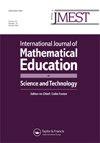Comparing Malaysian secondary school teachers’ and students’ values in mathematics learning: a mixed method study
IF 0.6
Q3 EDUCATION & EDUCATIONAL RESEARCH
International Journal of Mathematical Education in Science and Technology
Pub Date : 2023-05-02
DOI:10.1080/0020739X.2023.2204103
引用次数: 0
Abstract
Teachers’ and students’ values influenced the teaching and learning process in the mathematics classroom. Few studies were conducted to compare teachers’ and students’ value in mathematics learning. This paper explores Malaysian mathematics teachers’ and students’ values in mathematics learning. Fifty-three mathematics teachers and 354 secondary school students participated in the online survey. This study reports ten semantic differential items and an open-ended question related to mathematics learning. An independent t-test was conducted on the semantic differential items. Thematic coding analysis was performed to code the open-ended questions based on the framework of three intersecting values: mathematical values (the discipline), mathematics educational values (the pedagogy), and general educational values (the ethical and moral principles). The findings showed significant mean differences in mathematics educational values between teachers and students. No significant difference was found in mathematical values between teachers and students. Moreover, the qualitative data confirmed the similarities in mathematical values and differences in mathematics educational values between teachers and students. The current study also discusses possible reasons for the differences in teachers’ and students’ values. The findings imply that teachers’ and students’ values are crucial in enhancing teaching and learning in the mathematics classroom.马来西亚中学教师和学生数学学习价值观的比较:一项混合方法研究
教师和学生的价值观影响着数学课堂的教与学。很少有研究对教师和学生在数学学习中的价值进行比较。本文探讨了马来西亚数学教师和学生在数学学习中的价值观。53名数学教师和354名中学生参与了在线调查。本研究报告了与数学学习相关的十个语义差异项目和一个开放式问题。对语义差异项进行独立t检验。对开放性问题进行主题编码分析,基于三个交叉价值观的框架:数学价值观(学科)、数学教育价值观(教学法)和一般教育价值观(伦理和道德原则)。结果显示,教师与学生在数学教育价值观上有显著的平均差异。教师与学生在数学价值上无显著差异。此外,定性数据证实了教师和学生在数学价值观方面的相似性和数学教育价值观的差异性。本研究还探讨了教师和学生价值观差异的可能原因。研究结果表明,教师和学生的价值观对提高数学课堂的教与学至关重要。
本文章由计算机程序翻译,如有差异,请以英文原文为准。
求助全文
约1分钟内获得全文
求助全文
来源期刊

International Journal of Mathematical Education in Science and Technology
EDUCATION & EDUCATIONAL RESEARCH-
CiteScore
3.30
自引率
11.10%
发文量
123
期刊介绍:
Mathematics is pervading every study and technique in our modern world, bringing ever more sharply into focus the responsibilities laid upon those whose task it is to teach it. Most prominent among these is the difficulty of presenting an interdisciplinary approach so that one professional group may benefit from the experience of others. The International Journal of Mathematical Education in Science and Technology provides a medium by which a wide range of experience in mathematical education can be presented, assimilated and eventually adapted to everyday needs in schools, colleges, polytechnics, universities, industry and commerce. Contributions will be welcomed from lecturers, teachers and users of mathematics at all levels on the contents of syllabuses and methods of presentation.
 求助内容:
求助内容: 应助结果提醒方式:
应助结果提醒方式:


